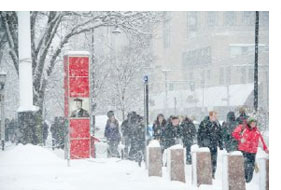Parent Magazine
Planning for the Unthinkable
What you should know about emergency response at BU.
By Lara Ehrlich (UNI’03)
Above photo of BU police and students by Cydney Scott
BUPD Alert: BUPD has reports of an explosion near the finish line of Boston Marathon on Boylston St. Information that people are injured in that area. Please remain out of the area of the Marathon route. Remain indoors and return to your residence at this time. More information to follow.
At 3:33 p.m. on April 15, 2013, 30,000 students’ mobile phones buzzed simultaneously with this text message from the Boston University Police Department (BUPD). Two bombs had exploded at the finish line of the Boston Marathon, resulting in the death of three people, including BU student Lingzi Lu (GRS’13). As the news careened around the world, BU parents desperately tried to reach their children. “As a parent, I know your children are the most precious thing you have,” says Stephen Morash, director of Emergency Response Planning (ERP) at BU. That’s why Morash and his team were prepared for a crisis of this scale—and were able to activate the University’s Emergency Response Plan within seconds.
Because this event left parents wanting to know more about safety preparation on campus, Parent asked Morash, the BUPD, Dean of Students Kenneth Elmore (SED’87), and communications administrators to help answer your most frequently asked questions about emergency planning and response at BU.
How does the University alert my child and me in the event of an emergency?

BU Alerts are for emergencies only, but information from how to send in tips anonymously to updates on ongoing investigations is available on the BUPD website. Photo by Cydney Scott
The BU Alert emergency notification system communicates critical information to University students, faculty, and staff. Alerts are disseminated quickly and efficiently through mobile phone text and voice messages, emails, pagers, and landline voice messages; students are required to verify their contact information each semester so that records remain up-to-date. Parents often ask if they can be added to the system, but BUPD Chief Thomas Robbins (COM’71) explains that the University’s top priority is to alert students, faculty, and staff immediately, and including parents would slow down a system where speed is critical.
“Our concern is for the safety of your children,” says Robbins. “I want to make sure that when I send out the alert, they’re getting it. What I tell students at Orientation, every information-sharing session, and on our website is that when they get that alert, they need to call their parents right away to say they’re okay.” The administration reinforces this instruction to students during times of crisis. Immediately after the Marathon bombings, Dean Elmore tweeted to the students: “Stay alert and safe—especially in Boston. Check in widely! Time to let your loved ones know you’re okay.”
How does the University keep students informed during a crisis?
The BUPD continues alerts with relevant updates and instructions, which are also posted to the BU homepage, the Emergency Management web page, the Medical Campus homepage, and BU’s daily news website BU Today—the best source for students and parents to access current, in-depth information. The comments section of an ongoing story serves as an open forum for students and parents to ask questions and obtain prompt responses.
During the citywide shelter-in-place order on April 19, 2013, BU administration, faculty, and staff monitored the comments section of an evolving BU Today story and responded to parent and student questions about transportation, dining hall availability, and the status of scheduled events. BU Today also works closely with the University’s social media staff to disseminate information through BU’s official Twitter feed and Facebook page.
President Robert A. Brown communicates directly with students when an event impacts campus safety and/or morale. Three hours after the Marathon bombings, the president sent students, faculty, and staff a personal email that summarized the situation, assuring the community that the BUPD was on duty to protect the campus and support the state police, and providing instructions for next steps. He reminded the community to monitor BU Today, which posted the email so that it would be available to parents.
In the aftermath of the Marathon bombings, “we also kept parents in the loop on the BU Parents Facebook page,” says Dean Elmore, who fielded phone calls from concerned parents. “We’re going to take your call, we’re going to listen, and we’re going to talk about how to problem-solve.”
What type of crisis is BU prepared to handle?
Every year, ERP conducts a hazard vulnerability assessment to determine the greatest risks facing the University and conducts drills for a wide range of potential crisis situations, from terrorist attacks to toxic chemical spills to weather-related incidents (in 2010, BU became the first university in Boston to be recognized as StormReady by the National Weather Service). After the April 2007 Virginia Tech shootings, for instance, BU began conducting active shooter drills with the BUPD and BU’s Emergency Response Team. Other drills in recent years have included how to deal with the stage collapsing at a commencement, a truck crashing into the medical school, an influenza pandemic breaking out, and an earthquake occurring.
How does the University take care of my child if the campus is closed during an emergency?

When the campus closes due to weather-related emergencies like blizzards, the BU Alert system and messages on BU Today and the homepage will notify students. Photo by Vernon Doucette
For anticipated emergencies like the 2013 blizzard, Nemo, the University staff has a plan to carry out essential services, like feeding hungry students, staffing the BU Medical Campus and Student Health Services, clearing snow, and keeping the campus secure. When the campus closes in the event of an unforeseen emergency, the University administrative departments—including BUPD, Emergency Response Planning, Dean of Students Office, Dining Services, and Facilities Management & Planning—join forces to answer what Morash identifies as the priority question: “How do we provide our students with the things they need when we’re not allowed to come into work?”
On April 19, 2013, University employees awoke to the announcement that Massachusetts Governor Deval Patrick had ordered a citywide shelter-in-place as the FBI hunted bombing suspect Dzhokhar Tsarnaev. Though the campus was closed, “we had to take care of the students—that’s our responsibility,” says Robbins.
“We had some conference calls going on early in the morning, and we prepared to do the things we needed to do to carry out the day,” Morash adds. “By about 9 o’clock, we had opened the command center. We found some ways to get folks in here” and deliver breakfast to the students at select dining halls. This decision involved quick planning to determine when the dining halls would be open, how the staff would inform students, and how students whose dorms did not have dining facilities would access the nearest dining halls.
Security was extremely important, says Robbins, who positioned uniformed officers along each of the routes that students might take to the dining halls. “You don’t want anyone getting hurt—but you also don’t want students to walk out of their dorms and ask, ‘Where is everyone?’ I wanted a uniformed officer saying hello to them when they walk by so they’d feel reassured.” Meanwhile, BU Today kept students informed and fielded questions from concerned parents.
How and where does my child receive information about staying safe on campus and in the wider Boston area?
BU’s Division of Student Affairs provides students with safety programming through the residence halls and hosts safety town hall meetings with the BUPD. For students who live off campus, Dean Elmore has started a series of off-campus safety town halls within the Allston, Brighton, and Brookline neighborhoods. Students may also access comprehensive safety information on the Safety on Campus website.
Where can my student find counseling after a traumatic incident?
In the event of a crisis, the University immediately provides students with counseling contact information through emails from the president, BU Today articles, and social media messages. Student Health Services offers University-wide counseling information and services, as well as a dedicated website with additional resources and information about traumatic event counseling.
Student safety is paramount at Boston University, and we want families to know that BU makes every effort to ensure that their students stay safe. If you have any further questions about emergency response at BU, please ask it below or on the BU Parents Program Facebook page and we’ll answer it for you.
In the wake of the Marathon bombings, a scholarship fund was established to honor Lingzi Lu. Please visit the scholarship page if you wish to donate or read messages of condolence from the BU community.







October 18, 2013
I think the priorities are correct. But could I make one suggestion … you have a wonderful Parent Assn. Why not have them set up their own “broadcast text message” system. You add just one extra text to your list of Students, Faculty and Staff and then the Parent system, running as a stand alone, will grind through texting all the Parents with the same info. You system runs as normal … but the parents do get the texts and informed as well.
It’s not “just” that we want to know our child is safe, that is first and foremost, but we also want to be prepared to deal with that phone call when it comes. To reinforce the campus plan. To calm down our child and refocus them on the information you sent. To assure them that this is the best plan for follow and that they are doing the right thing to listen to the BU staff.
Then same could be done for voice mail, for the same reasons. I am sure the Parents Assn can raise any necessary funds.
Just an idea. Thanks for all the planning. Great job!!
Bob